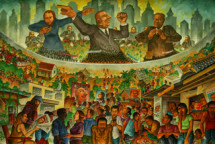Rural roots of the rise of the Justice and Development Party in Turkey
Topics
Analysing the rural roots of Erdoğan’s Justice and Development Party's political power in Turkey and providing an alternative to existing explanations, by identifying its material basis.

Downloads
Authors
The uninterrupted rule of Recep Tayyip Erdoğan’s Justice and Development Party (Adalet ve Kalkınma Partisi, AKP hereafter) since the 2002 general election represents the peak of Turkish Islamism. Despite rapid urbanisation, about a quarter of Turkey’s population is still rural and AKP’s vote share has been consistently higher in the countryside than in the cities. This is a particularly interesting phenomenon because the great majority of the opposition and other parties believe that the AKP has waged a war against agriculture and farmers with the aim of completely de-agrarianising the country and making it entirely dependent on agricultural imports.
During the last fifteen years, the AKP has significantly transformed the Turkish economy, society, and politics. In the economic realm, by privatising the great majority of the state-owned enterprises, the AKP has finished the job that the (relatively) secular parties of the centre (right and left) started in the 1980s but had not made comparable progress. In other words, Turkish neoliberalism has been consolidated under the AKP rule. On the other hand, by supporting the Islamist bourgeoisie much more than the secular bourgeoisie through generous government contracts, state bank credits and other favoritisms, AKP has taken significant progress (although not completed yet) in altering the balance of power within the Turkish bourgeoisie in favor of its Islamist wing.
AKP’s transformation of society and politics is related to but goes much deeper than its economic performance. The ruling party has implemented an ambitious project of unmaking the relatively secular character of the state and society and reconstructing them on an Islamist basis. To this end, the government has considerably altered the curriculum and personnel from primary schools to universities, boosted the power of the Directorate of Religious Affairs, provided generous financial and political support to schools and hospitals run by Islamist foundations, and suppressed the secular and leftist opposition. Through a complex combination of carrots and sticks, by making and unmaking various (and often contradictory) alliances over the years, the AKP has managed to control key state institutions, weaken the secular mainstream parties and organizations, and further marginalized the Kurdish movement and radical left.
Since the AKP has not yet managed to maintain political stability, it is difficult to predict the future of Turkish Islamism. However, AKP ’s significant mass support and uninterrupted rule notwithstanding successive serious crises is an undeniably remarkable success of that should be seriously investigated. We examine the role of factors such as rural people ’s perception of government policies and their living standards historically – in comparison with those in the (recent) past-, their bargaining with the government (through street protests and the ballot box), and the resulting concessions they have gained.
This paper was presented at the Emancipatory Rural Politics Initiative (ERPI) 2018 Conference: "Authoritarian Populism and the Rural World"